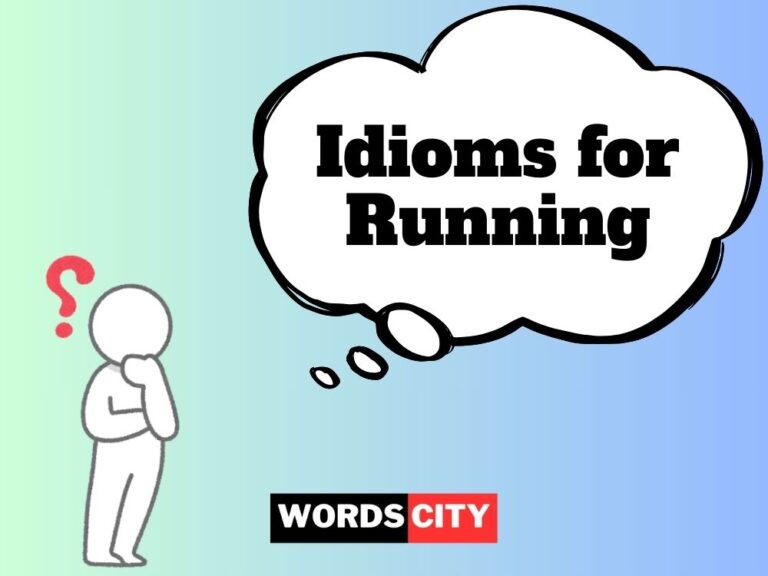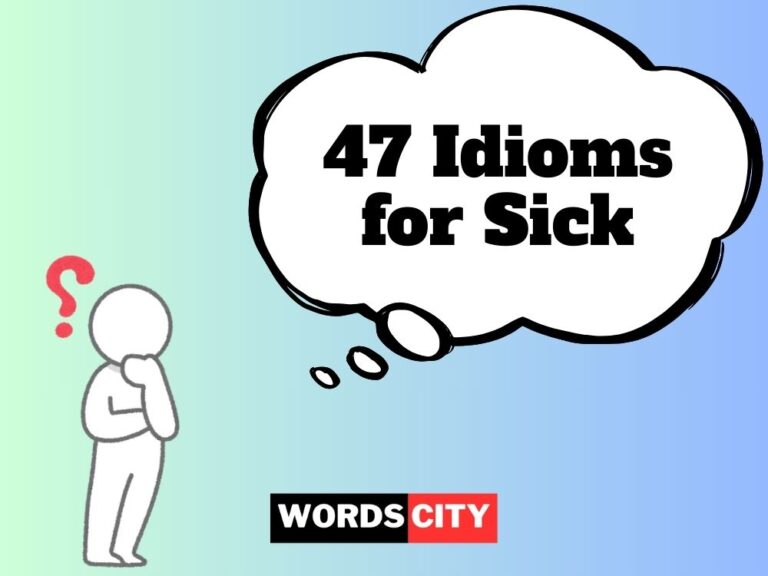Idioms are playful expressions that make language more interesting and fun. They don’t always mean what the words seem to say, but they help us say things in a creative and clever way. When it comes to describing negative experiences or feelings, idioms give us a light and often humorous way to talk about difficult situations.
Learning idioms for bad situations can help us explain problems, express emotions, and even connect with others who understand what we’re going through. Whether you’re talking about a tough day, a bad habit, or something that went terribly wrong, these phrases make communication more colorful and relatable.
In this article, you’ll discover 42 idioms that describe bad situations, meanings behind them, examples in everyday use, and alternative ways to say them. Get ready to explore how the not-so-good side of life can still sound pretty cool with the right words!
Idioms for Bad
1. Down in the dumps
Meaning: Feeling very sad or low.
In a Sentence: She’s been down in the dumps since her dog ran away.
Other Ways to Say: Feeling blue, Depressed
2. A rough patch
Meaning: A difficult period of time.
In a Sentence: We’re going through a rough patch in our friendship.
Other Ways to Say: Hard time, Tough moment
3. Hit rock bottom
Meaning: To reach the lowest or worst point.
In a Sentence: After losing his job, he felt like he hit rock bottom.
Other Ways to Say: Lowest point, Worst stage
4. In hot water
Meaning: In serious trouble.
In a Sentence: He was in hot water after breaking the school window.
Other Ways to Say: In trouble, Facing consequences
5. Go south
Meaning: To go badly or decline quickly.
In a Sentence: Our plans went south when it started raining heavily.
Other Ways to Say: Fail, Fall apart
6. A black eye
Meaning: A situation that damages a reputation.
In a Sentence: The scandal gave the company a black eye.
Other Ways to Say: Bad reputation, Public shame
7. Up the creek without a paddle
Meaning: In a difficult situation without a solution.
In a Sentence: I forgot my notes for the speech and was up the creek without a paddle.
Other Ways to Say: Stuck, In big trouble
8. Hit a snag
Meaning: To face an unexpected problem.
In a Sentence: We hit a snag while fixing the car—it needs a new battery.
Other Ways to Say: Face a problem, Run into trouble
9. In a pickle
Meaning: In a confusing or difficult situation.
In a Sentence: I’m in a pickle—I double-booked my plans!
Other Ways to Say: In a jam, In trouble
10. Bite the dust
Meaning: To fail or be defeated.
In a Sentence: Our team bit the dust in the championship game.
Other Ways to Say: Fail, Lose
11. A tough nut to crack
Meaning: A difficult problem or person to deal with.
In a Sentence: That math problem was a tough nut to crack.
Other Ways to Say: Hard to solve, Challenging
12. On thin ice
Meaning: In a risky or dangerous situation.
In a Sentence: You’re on thin ice after skipping two rehearsals.
Other Ways to Say: At risk, In danger
13. A bitter pill to swallow
Meaning: Something hard to accept.
In a Sentence: Losing the game was a bitter pill to swallow.
Other Ways to Say: Hard truth, Painful reality
14. Rub salt in the wound
Meaning: To make a bad situation worse.
In a Sentence: Laughing at her mistake just rubbed salt in the wound.
Other Ways to Say: Make it worse, Add insult to injury
15. A can of worms
Meaning: A complicated problem that causes more trouble when dealt with.
In a Sentence: Talking about the broken trust opened a can of worms.
Other Ways to Say: Messy situation, Big problem
16. At your wit’s end
Meaning: To be very frustrated or out of solutions.
In a Sentence: I’m at my wit’s end trying to fix this app.
Other Ways to Say: Frustrated, Out of ideas
17. Cry over spilled milk
Meaning: To be upset about something that can’t be changed.
In a Sentence: It’s just a broken pencil—don’t cry over spilled milk.
Other Ways to Say: Let it go, Move on
18. Blow a fuse
Meaning: To get very angry.
In a Sentence: Dad blew a fuse when he saw the messy room.
Other Ways to Say: Lose temper, Explode
19. A storm in a teacup
Meaning: A small problem blown out of proportion.
In a Sentence: That fight over the TV remote was just a storm in a teacup.
Other Ways to Say: Overreaction, Big deal over nothing
20. Go off the rails
Meaning: To lose control or act in a wild way.
In a Sentence: He went off the rails after getting suspended.
Other Ways to Say: Act out, Lose control
21. A slap on the wrist
Meaning: A mild punishment for something bad.
In a Sentence: He got a slap on the wrist for cheating on the quiz.
Other Ways to Say: Light punishment, Gentle warning
22. Skeletons in the closet
Meaning: Hidden secrets, usually shameful or embarrassing.
In a Sentence: That celebrity has some serious skeletons in the closet.
Other Ways to Say: Hidden past, Secret shame
23. Open a Pandora’s box
Meaning: To start something that causes many new problems.
In a Sentence: Asking about the budget opened a Pandora’s box of complaints.
Other Ways to Say: Stir up trouble, Create problems
24. A raw deal
Meaning: Unfair treatment.
In a Sentence: She got a raw deal when her idea was stolen.
Other Ways to Say: Treated unfairly, Unjust result
25. Burned out
Meaning: Completely exhausted or fed up.
In a Sentence: I’m totally burned out from studying all night.
Other Ways to Say: Worn out, Drained
26. Blow it
Meaning: To mess up an opportunity.
In a Sentence: I blew it by forgetting my lines during the audition.
Other Ways to Say: Mess up, Ruin it
27. A bad apple
Meaning: A person who negatively influences others.
In a Sentence: One bad apple in the team ruined the whole project.
Other Ways to Say: Troublemaker, Bad influence
28. Drag one’s feet
Meaning: To delay doing something.
In a Sentence: He kept dragging his feet about cleaning his room.
Other Ways to Say: Procrastinate, Stall
29. Fall through the cracks
Meaning: To be overlooked or forgotten.
In a Sentence: My assignment fell through the cracks during the busy week.
Other Ways to Say: Missed out, Neglected
30. Have a chip on your shoulder
Meaning: Acting angry or holding a grudge.
In a Sentence: He’s had a chip on his shoulder ever since the promotion.
Other Ways to Say: Hold a grudge, Be defensive
31. Not playing with a full deck
Meaning: Acting strangely or not thinking clearly.
In a Sentence: That idea was so wild, I thought he wasn’t playing with a full deck.
Other Ways to Say: Acting weird, Not thinking straight
32. Cut corners
Meaning: To do something poorly to save time or money.
In a Sentence: They cut corners on the project, and it didn’t work properly.
Other Ways to Say: Rush, Do a poor job
33. Drop the ball
Meaning: To make a mistake or fail to do something.
In a Sentence: I dropped the ball by forgetting to email my teacher.
Other Ways to Say: Mess up, Fail to follow through
34. A dead end
Meaning: A situation with no progress or solutions.
In a Sentence: Our search for the lost key was a dead end.
Other Ways to Say: No solution, Roadblock
35. Get the short end of the stick
Meaning: To be treated unfairly.
In a Sentence: She got the short end of the stick when they split the prize.
Other Ways to Say: Unfair deal, Unlucky outcome
36. Go up in smoke
Meaning: To fail completely or be destroyed.
In a Sentence: All my weekend plans went up in smoke when I got sick.
Other Ways to Say: Fall apart, Be ruined
37. A hard pill to swallow
Meaning: A difficult fact or situation to accept.
In a Sentence: Realizing he was wrong was a hard pill to swallow.
Other Ways to Say: Tough truth, Painful realization
38. Hit the skids
Meaning: To begin to fail or decline.
In a Sentence: His grades hit the skids after he stopped attending class.
Other Ways to Say: Decline, Go downhill
39. Like a bad penny
Meaning: Someone or something unwanted that keeps appearing.
In a Sentence: That rumor keeps turning up like a bad penny.
Other Ways to Say: Keeps coming back, Unwanted return
40. In over your head
Meaning: In a situation too difficult to handle.
In a Sentence: I’m in over my head with all these advanced classes.
Other Ways to Say: Overwhelmed, Too much to handle
41. Barking up the wrong tree
Meaning: To blame the wrong person or look in the wrong place.
In a Sentence: If you think I broke your phone, you’re barking up the wrong tree.
Other Ways to Say: Mistaken blame, Wrong idea
42. A sinking ship
Meaning: A failing situation, usually one people want to escape from.
In a Sentence: That business was a sinking ship, so everyone quit.
Other Ways to Say: Falling apart, Hopeless situation
Exercise to Practice
Fill in the blanks:
- After the team lost three games in a row, things really hit _______ bottom.
- I forgot my costume on the play’s opening night—I was up the _______ without a paddle.
- She’s totally _______ out from all the late-night studying.
- That old rumor came back again, just like a bad _______.
- You’re _______ up the wrong tree if you think I told the secret.
- They _______ corners building the set, and it fell over during rehearsal.
- When the surprise failed, our whole plan went up in _______.
- He _______ the ball by missing our group meeting.
- I’m in way over my _______ with this advanced science project.
- That argument over chores was really a storm in a _______.
- Skipping the meeting gave our group a black _______.
- We hit a _______ while setting up the projector—it wouldn’t turn on.
Answers:
rock, creek, burned, penny, barking, cut, smoke, dropped, head, teacup, eye, snag
Conclusion
Idioms make conversations more engaging, especially when talking about tough situations. These 42 idioms give us new ways to describe struggles, mistakes, and bad moments—without sounding dull or overly serious. They help us share experiences, laugh about challenges, and show that even in hard times, language can be fun and expressive.
Keep practicing these idioms by using them in your everyday chats, school writing, or even journaling. The more you use them, the more natural they’ll feel. And remember—just because something goes “bad” doesn’t mean it can’t make a good story later. Language is powerful, and idioms bring it to life.




